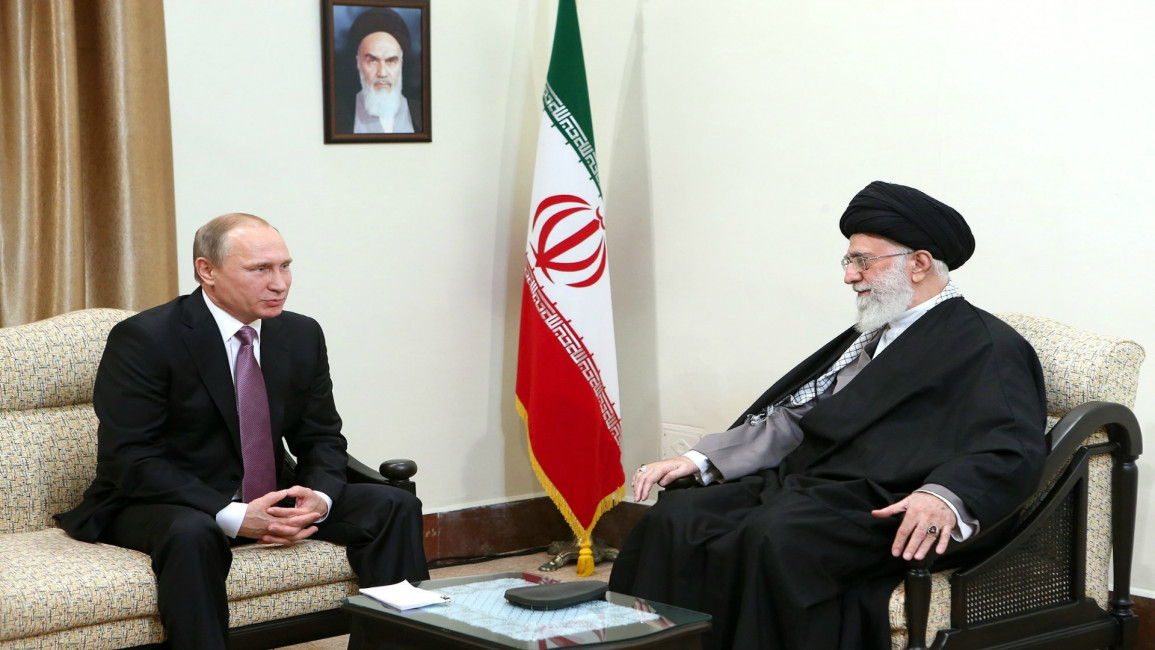
Divine interventions: Putin 'sees Jesus in Khamenei'
Putin has travelled to
Khamenei, Iran's supreme leader, said in return that "we want a strong
In the second visit, this November, Khamenei described Putin as "a prominent figure in today's world". He also praised Putin's positions - especially over the past year and a half, as "very good and creative".
Khamenei has never praised any foreign leader in this way.
In the past 18 months, Putin has occupied and annexed Crimea. His propping up of separatists in Eastern Ukraine has led to the deaths of 8,000 people and the destruction of an aircraft with 298 passengers and crew members on board. And he's got his military stuck into Syria.
Khamenei believes that all these actions are to put
Common personal characteristics
Khamenei and Putin have a lot in common: both have decades of working in the security establishment and picking all their staff from high-ranking security operatives.
Putin and Khamenei are malevolent dictators who scheme to remain the heads of their countries forever, one by playing president and prime minister roles alternatively, and another by claiming to be the representative of God on earth.
Putin worked for the KGB in
Both leaders try to prove they are tough guys: Putin by demonstrating his physical abilities and taking part in dangerous acts such as extreme sports and interacting with wild animals, and Khamenei by mountain climbing and talking angrily about his opponents.
Russian and Iranian state TV both broadcast video of each as ultra-humans: Putin is shown co-piloting a firefighting plane to dump water on a raging wildfire, while Khamenei is shown as a sacred being, radiating light while walking.
| They show their insecurity by clamping down on press freedom, engineering elections and assassinating dissidents |
They both show their insecurity by clamping down on the freedom of the press, engineering parliamentary and presidential elections, and assassinating dissidents.
Their paranoia is also typical of insecure individuals. They think like a spy and suspect everyone's motives.
Ideas
They both are homophobes. Homosexuality is banned in both countries. This is not just due to practical or religious reasons. They cannot imagine a society with gender diversity.
Khamenei's noxious comments about feminists and secularists and Putin's comments on the moral bankruptcy of the West are to instigate the religious sensibilities of believers. Their propaganda machines present the western world as rubbish, immoral and aggressive.
The alternative for liberal democracy for them is "dictatorship of the new elite" in
The Khameni and Putin regimes are convinced that all peaceful popular uprisings and rational criticism by their citizenry of recent times were inspired by the
Leadership style
Putin has revived the tzars' leadership style, while Khamanei loves Qajar kings' manners. They have a nation-wide militia to oppress opposition whenever and wherever it rises.
To have the support of religious establishment, they have funnelled billions of Tomans and billions of Rubles into the religious bureaucracy. They directly pay for renovation of churches and mosques and the building of new ones. Both leaders want people to be obedient masses and not informed and organised individuals.
They are both above the law, unaccountable to elected bodies of government, and wary of checks and balances. They love political and cultural engineering and legitimise their restrictive and sometimes totalitarian actions based on fear of the West's influence.
Populism and anti-west policies
Khamenei and Putin have all the elements of past demagogues. Their slogan is "tell them we will not let them have influence". Khamenei and Putin pretend to be the voices of the aggrieved - while they are both billionaires and the source of grievances in their own countries.
They are both resenters and denouncers to represent two categories of grievances. Both leaders love a fight with the West, but do not have courage to begin one.
They always attack the West with insults. Khamenei never uses the term najes ["dirty"] for people other than Bahais - but he means the same thing when he talks about Iranians who do not agree with him and who favour the West.
He even calls all westerners "savages". Putin calls his opponents "Nazis".
| They play the role of confident men while they exterminate every criticism |
Khamenei and Putin pretend to be the angry saviour of Iranian and Russian conspiracy theorists who want to rescue the country from the so-called (and imagined) western intrusion. Instead of offering a positive vision, they always push a message that plays to the grievances of those who envied the West.
Even some educated and secular individuals believe that these leaders want only to make
Supremacy
Putin and Khamenei play with supremacist ideas among their constituents. Khamenei suspects that many Shia Islamists are ideological supremacists, and gives them a certain cover for the real thing they have been acting on.
He is the voice of Shia supremacists, and his long and continuing challenge to "outsiders" is code language for najes. Whether or not Putin really believes the semi-mystical philosophy of "Eurasian" supremacy, he has used it to justify
They play the role of confident men while they exterminate every criticism of their way of governance.
They are full of hyperbole and shiftiness and alienated from normal politics. They are not even able to make people just line up and buy things from them. They hate political parties and are anti-politics - while running countries as the chief politicians.
Khamenei and Putin may not have read Mark Twain but they act as if they themselves say "to succeed in life you need two things: confidence and ignorance".
Majid Mohammadi is an Iranian-born academic and the author of several books in Persian and English on politics, arts and religion in Iran.
Opinions expressed in this article remain those of the author and do not necessarily represent those of al-Araby al-Jadeed, its editorial board or staff.




